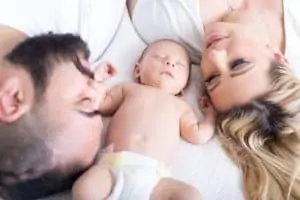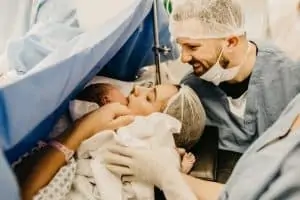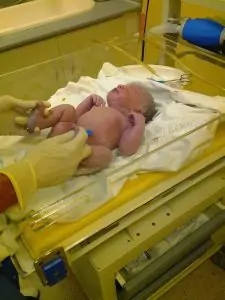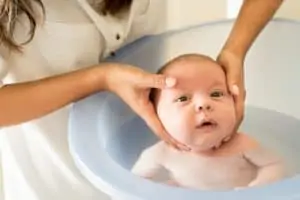When your new baby is born, everyone is going to be excited. Friends and relatives alike will all want to come over in droves to see the baby, but I’m here to tell you to please, for the sake of your baby, tell them “no.”
It might sound harsh or rude, but it’s imperative to limit the people your baby comes into contact with, at least initially. Experts advise that you wait several months until your baby has had her first vaccines before taking her into public places, though that’s not always possible either.
Enacting the no visitors for two weeks after the birth rule is a pretty smart idea though. Yes, you’ll likely want help from immediate family, but there are some things you can do to keep your baby safe from germs (more on that below). When you have family visiting after the baby is born, you’ll have to adopt a strictly no-nonsense approach.
Why You Need to Get Tough on Visitors
Most people really do mean well. No one ever wants to be the responsible party that gets the baby sick. But relatives, especially older ones, feel a pressing need to come over and see the baby.
You might love your grandparents or your great aunt, but unless they are a daily fixture in your life right now, for the sake of your baby, put your foot down. The same goes for friends too. Unless it’s your best friend who’s been with you every step of the way during this pregnancy and your immediate family is far away. If she has kids of her own, she’ll leave them with her husband and make sure she doesn’t even so much as have a slight cough when she comes.
Isn’t having a baby a time of joy, though? Not a time when you want to seclude yourself? If you’re asking this, then take a moment to read this article from CBS News about a baby that died after a kiss.
So, no, it isn’t harsh to keep people away and make them follow strict rules.
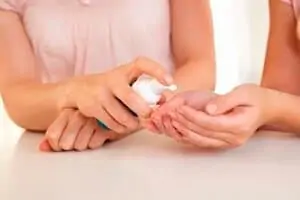
In my own home, after I had my eldest, my husband sat his parents down and explained to them that they were to follow our wishes for sanitizing their hands before touching the baby. They were instructed not to kiss her on the face or hands. They were also asked to keep their well-meaning relatives away until she got just a bit bigger.
Lucky for us, in Chinese culture, there is a 100-day celebration of a baby’s life. This is a big party they throw on the 100th day of life to represent the wish that a baby will live for 100 years. It’s kind of sweet actually. By this point, my eldest had some of her vaccinations but the relatives were all asked not to touch her without cleaning their hands first.
I wasn’t worried about them. I was concerned about strangers, well-meaning as they were.
In China:
People think nothing of coming up and touching your baby on the cheek or the hands. They’re just trying to be nice but what they don’t realize is the germs that could be lurking on their hands. My husband and I were very busy every time we went anywhere, swatting away hands and trying to keep people from touching our baby.
We were much more prepared after our youngest was born.
In America, it’s much less common, but friends have told me strangers have tried to touch their baby here (and they were not Chinese!).
How to Politely Refuse Other Visitors
So now that you know why you shouldn’t let everyone in to visit the baby or bring her round too many places in her first few weeks and months of life, how do you convey that to relatives and friends?
If possible, have your husband be the “bad cop” in this. This is a good tactic if people pop by without calling first (which isn’t polite whether there’s a new baby or not).
But if that doesn’t curb the unwanted visitors, you can put a sign on the door that says, “Shhh! Thanks for coming by but we’re all tired, especially the baby. Please let us rest, and we’ll reach out when we’re ready to show you our new little bundle!” It’s polite and friendly but makes your point.
At the hospital, you can restrict who comes in. That’s even better because the hospital staff can decline people for you. You’re on your own once you’re home though.
What Visitors Should Do When Meeting Baby
I’m going to say this just once…anyone that you allow to see your baby poses a potential health risk. Think about this before you go into labor. Make a list of who you would let in the hospital to see you. It should be a concise list. Then, use that as your guide for who should come over once you’re home.
What if I have a large family, you ask? Well, then you must ask them to give you all some time to settle in. And if anyone gets pushy, have your husband put his foot down. Plain and simple.
Once you’ve determined who you will allow over to see the baby after she’s born, make sure you follow these things:
- If anyone has been sick, don’t let them come over for a week. I don’t care how much you love your mom – I love mine too! But if she has even the slightest cold, the first-week baby comes home from the hospital; she’s not allowed over. Babies have compromised immune systems, and you have to protect your child.
If you’ve had your vaccinations, your baby will get the benefits of them from your breastmilk, but there are some things you won’t be able to pass along yet. Until that immunity gets stronger, keep anyone that has been sick far away.
- Keep hand sanitizer handy. Soap too. No one should touch the baby – not even you or your husband – without cleaning your hands first.
- No kisses on the face or hands. This is how nasty germs can spread. Even newborns can sometimes get their hands into their mouths. Some suggest kissing the very top of the head or even better, the feet because it’s less likely that any germs can infect the baby.
I’ve mentioned that my father is a doctor, and one thing you need to know is that sometimes, you can be carrying germs without knowing it. There are times when you’ll come into contact with bacteria that can make you sick, but your immunity is secure, and you don’t get sick.
That doesn’t mean you can’t pass those germs to someone else though. Sometimes you do get sick from those germs if you’ve been burning the candle at both ends. What I’m getting at here is this…someone could come over and seem totally healthy and not know they have germs. They may not even get sick after that. Or they could call you days later after they’ve visited and warned you that they’ve just gotten ill.
I’m not trying to make you panic, but rather, help you see why it’s so essential to be Captain Buzzkill by making everyone clean their hands and abide by your visitation rules. The fewer people your baby is exposed to early on, the better it will be for her health. Everyone will have a chance to meet her soon.
You may even want to do as the Chinese do and throw a 100-day celebration. Ours was certainly fun!
So, in summary,
Make sure you limit visitors for the first two weeks at the very least. Try to stay out of public places for the first few months. If you do need to go somewhere crowded and open with the baby, be vigilant for people that try to get too close or that one person that coughs or sneezes without covering it (they’re everywhere…ugh!). Keep sanitizer on you always when you’re out to keep your own hands clean.
You can also put those little mitts on your baby that keep her from scratching herself, though don’t expect her to keep them on. Our eldest tossed hers somewhere between our house and the city bus stop. At least we tried.
One more thing – try not to worry too much. You have to put your baby first, so focus on that. Some people will get offended no matter how politely you tell them no but don’t let them push you into it. Be firm and let them know you’ll make a special point to see them when the baby can have visitors and that’s that!
Leslie Berry lives with her husband and two young daughters in Los Altos, California, where she loves helping other moms get comfortable with motherhood and embracing the insanity with facts peppered with laughs.
She loves eating too much sushi, exercising, and jamming out on her Fender. Read more about Leslie here.

